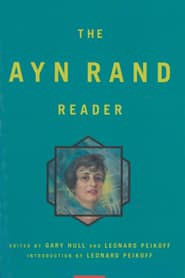

Mentions of Ayn Rand — and references to her ideas — pop up routinely today, and naturally many people are curious about what she actually stood for. Given that her fiction and philosophical writings span several thousands of pages across numerous books, where might a time-pressed person begin?
Edited by Gary Hull and bringing together excerpts from Rand’s four novels and her nonfiction, The Ayn Rand Reader offers a sample of her philosophic vision and artistic expression — in her own words.
For those curious about Rand’s controversial views or intrigued by the power of her widely popular novels, this book offers a starting point from which to form your own firsthand view as well as leads for you to explore further.
— Leonard Peikoff, “Introduction,” The Ayn Rand Reader
For readers who know little or nothing about Ayn Rand, this anthology of her fiction and nonfiction offers an introduction to her thought.
Excerpts from Rand’s most famous and philosophical novels, Atlas Shrugged and The Fountainhead,provide glimpses of Rand’s dramatic literary style and introductions and insights into some of her most beloved characters: Howard Roark, Dominique Francon, John Galt, Hank Rearden, Francisco d’Anconia and Dagny Taggart. Also included are passages from Rand’s first and most autobiographical novel, We the Living, and from the novelette Anthem.
Alternating with these fiction excerpts are passages from Rand’s nonfiction that elaborate on themes captured in the novels. For instance, following excerpts from The Fountainhead are discussions by Rand of the nature of rational selfishness and the evil of altruism, themes that figure prominently in the novel. And following excerpts from Atlas Shrugged are discussions by Rand of the relation between the fields of metaphysics and sex, the power of reason, and the connection of reason to freedom, again themes that figure prominently in the novel.
“There are two moral questions which altruism lumps together into one ‘package-deal’: (1) What are values? (2) Who should be the beneficiary of values? Altruism substitutes the second for the first; it evades the task of defining a code of moral values, thus leaving man, in fact, without moral guidance.
“Altruism declares that any action taken for the benefit of others is good, and any action taken for one’s own benefit is evil. Thus the beneficiary of an action is the only criterion of moral value — and so long as that beneficiary is anybody other than oneself, anything goes.
“Hence the appalling immorality, the chronic injustice, the grotesque double standards, the insoluble conflicts and contradictions that have characterized human relationships and human societies throughout history, under all the variants of the altruist ethics.”
— Ayn Rand, “Why ‘Selfishness’?” The Ayn Rand Reader
Ayn Rand was often asked whether she considered herself primarily a novelist or primarily a philosopher.
She did not think it was a good question.
“The motive and purpose of my writing is the projection of an ideal man. The portrayal of a moral ideal, as my ultimate literary goal, as an end in itself — to which any didactic, intellectual or philosophical values contained in a novel are only the means. . . .
“This is why I feel a very mixed emotion — part patience, part amusement and, at times, an empty kind of weariness — when I am asked whether I am primarily a novelist or a philosopher (as if these two were antonyms), whether my stories are propaganda vehicles for ideas, whether politics or the advocacy of capitalism is my chief purpose. All such questions are so enormously irrelevant, so far beside the point, so much not my way of coming at things.”
At the base of Ayn Rand’s philosophy is what she calls the axiom of existence.
“Existence exists — and the act of grasping that statement implies two corollary axioms: that something exists which one perceives and that one exists possessing consciousness, consciousness being the faculty of perceiving that which exists.
“If nothing exists, there can be no consciousness: a consciousness with nothing to be conscious of is a contradiction in terms. A consciousness conscious of nothing but itself is a contradiction in terms: before it could identify itself as consciousness, it had to be conscious of something. If that which you claim to perceive does not exist, what you possess is not consciousness.
“Whatever the degree of your knowledge, these two — existence and consciousness — are axioms you cannot escape, these two are the irreducible primaries implied in any action you undertake, in any part of your knowledge and in its sum.”
Ayn Rand admired the political achievement of America’s Founding Fathers above all others because it redefined the relationship of the individual to society.
“All previous systems had regarded man as a sacrificial means to the ends of others, and society as an end in itself. The United States regarded man as an end in himself, and society as a means to the peaceful, orderly, voluntary coexistence of individuals. All previous systems had held that man’s life belongs to society, that society can dispose of him in any way it pleases, and that any freedom he enjoys is his only by favor, by the permission of society, which may be revoked at any time. The United States held that man’s life is his by right (which means: by moral principle and by his nature), that a right is the property of an individual, that society as such has no rights, and that the only moral purpose of a government is the protection of individual rights.”
In addition to writing best-selling novels and philosophical essays, Ayn Rand wrote about the events and trends of her time, from which she drew timeless lessons.
Featured in The Ayn Rand Reader is Rand’s commentary on two important cultural events from the summer of 1969: the Apollo 11 moon flight and the Woodstock Festival. Rand herself was present at the historic Apollo 11 moon launch as an invited guest of NASA and writes glowingly of the experience.
She later contrasts the Apollo 11 moon flight, a demonstration of the efficacy of man’s mind, with the Woodstock Festival, an abdication of the mind. Rand explores the views of participants, commentators and spectators in search of the two events’ philosophic causes and meaning.
Ayn Rand’s heroes are men of thought and action: exactingly logical and intensely passionate; moral and practical. In every way, they represent the harmony of mind and body.
Rand applies her distinctive view of the relation between mind and body to love and sex in essays excerpted in The Ayn Rand Reader, including a passage from her article “Of Living Death.” There Rand explains that a “selfless” love is a contradiction in terms and that romantic love is a man’s (or woman’s) “response to his own highest values in the person of another — an integrated response of mind and body, of love and sexual desire. Such a man (or woman) is incapable of experiencing a sexual desire divorced from spiritual values. . . . In other words, sexual promiscuity is to be condemned not because sex as such is evil, but because it is good — too good and too important to be treated casually.”